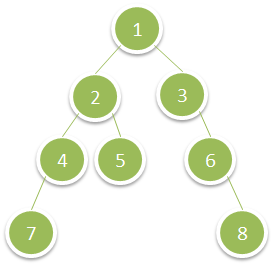Problem: Given the root of a binary tree, return the sum of values of its deepest leaves.
Example:

Input: root = [1,2,3,4,5,null,6,7,null,null,null,null,8] Output: 15
Input: root = [6,7,8,2,7,1,3,9,null,1,4,null,null,null,5] Output: 19
Constraints:
- The number of nodes in the tree is in the range [1, 104].
- 1 <= Node.val <= 100
Approach: We can use preorder traversal. We can take current level and max depth as parameters in the recursive method:
- If current level is equal to max depth, add the node's value to result sum.
- if current level is more than max depth then that means we have calculated sum for wrong level so we make the result sum as 0 and assign current level to max depth.
- if current level is less than max depth, we don't need to change result sum or max depth.
That's all.
Implementation in C#:
public int DeepestLeavesSum(TreeNode root)
{
if (root == null)
{
return 0;
}
int maxDepth = 0;
int leavesSum = 0;
this.DeepestLeavesSum(root, 0, ref maxDepth, ref leavesSum);
return leavesSum;
}
private void DeepestLeavesSum(TreeNode node, int currLevel, ref int maxDepth, ref int leavesSum)
{
if (node == null)
{
return;
}
if (currLevel > maxDepth)
{
maxDepth = currLevel;
leavesSum = 0;
}
if (currLevel == maxDepth)
{
leavesSum += node.val;
}
this.DeepestLeavesSum(node.left, currLevel + 1, ref maxDepth, ref leavesSum);
this.DeepestLeavesSum(node.right, currLevel + 1, ref maxDepth, ref leavesSum);
}
Complexity: O(n)
No comments:
Post a Comment